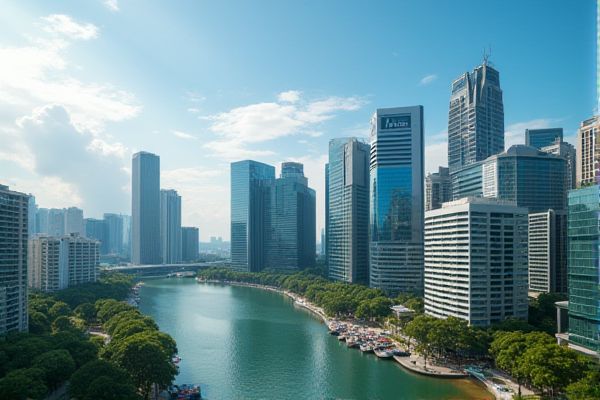
Cost of living in Singapore: High rental prices. Food and dining costs. Transportation expenses. Utility bills. Education fees. Healthcare costs. Entertainment and leisure. Clothing and shopping. Imported goods prices. Public transportation passes.
High rental prices
In recent times, Singapore has faced a significant increase in rental prices, making it the world's most expensive city for renters. For instance, HDB rental prices for 4-room flats in Q1 2024 ranged from S$3,000 to S$4,350, reflecting variations across different towns. This fluctuation is primarily attributed to factors such as increased housing supply, regulatory adjustments, and a growing population coupled with limited housing availability. The average monthly cost for a one-bedroom apartment now stands at approximately S$3,636, further influenced by high demand from expatriates and global talent. With such dynamics, Singapore's real estate market has become the most expensive rental market in the Asia-Pacific region. For more detailed information on these trends, you can visit the Cost of Living in Singapore.
Food and dining costs
In Singapore, the cost of food and dining varies widely; a meal at an inexpensive restaurant can cost around S$14, a mid-range restaurant meal for two people can cost S$90, and fast food like a McDonald's meal can cost around S$10. Groceries are also relatively expensive, with items like milk costing S$3.59 per liter and chicken fillets costing S$13.65 per kilogram. For more detailed information, the Cost of Living in Singapore website offers comprehensive insights into these expenses.
Transportation expenses
In Singapore, the average monthly transportation expenses vary significantly depending on the mode of transport. Public transport, such as buses and MRT, costs around INR 9,000 per month, while taxis range from INR 12,000 to 18,000. Car ownership can be especially expensive, with costs soaring as high as INR 92,000 to 1.8 lakh per month. For a detailed breakdown of these costs and how they impact daily life in Singapore, you can visit the Cost Of Living In Singapore page.
Utility bills
In Singapore, the average monthly utility bill for a 4-room HDB flat is approximately S$130, with electricity accounting for 50%, water services for 40%, and gas services for 10%. Utility costs are expected to rise due to increases in electricity, gas, and water tariffs. Recent hikes include a 4.1% increase in electricity tariffs and a 3.3% increase in gas tariffs from January to March 2024. For more detailed information on the current costs and how to manage these expenses, you can visit the ValueChampion website.
Education fees
The average total cost of education in Singapore is estimated to be $71,409, with significant variations depending on the student's residency status. For example, university tuition fees for Singapore citizens are $38,250. However, permanent residents and international students pay substantially more, with non-subsidised international students paying up to $151,862 for a 4-year degree. More details on these statistics can be found on the Smart Wealth website, which provides further insights into educational expenses across different categories and statuses.
Healthcare costs
Healthcare costs in Singapore have risen significantly, with medical and dental treatment costs increasing by nearly 78% over the last 20 years, or more than 2.9% per annum, almost double the overall inflation rate. Government healthcare expenditure is also expected to triple from $13.2 billion in 2020 to $36 billion by 2029, driven by an aging population and increased healthcare consumption. To understand more strategies on tackling this issue, visit the Fighting Healthcare Inflation in Singapore page.
Entertainment and leisure
In Singapore, entertainment and leisure costs can vary widely, typically ranging from INR 1,235 to INR 12,352 per month. These expenses include activities such as movies, gym memberships, dining out, and other recreational pursuits. To better understand and plan your budget for living in this vibrant city, you can explore more detailed insights through the Cost of Living in Singapore on Leap Scholar's website. By keeping track of these costs, residents and visitors alike can enjoy the diverse array of entertainment options available in Singapore without breaking the bank.
Clothing and shopping
In Singapore, clothing is significantly more expensive, with items like regular jeans from Levi's costing around SGD 89.42, dresses from H&M costing SGD 59.81, and running shoes from Nike or Adidas costing SGD 130.39. This reflects a higher cost of living compared to the United States. Shopping in Singapore is notably expensive, with items such as T-shirts priced at S$35, backpacks at S$30, and basic sneakers up to S$50, which is roughly double the cost of similar items in other cities like HCMC. This highlights Singapore's position as one of the world's most expensive cities.
Imported goods prices
Singapore's cost of living is heavily impacted by the prices of imported goods, particularly due to its reliance on imports for energy and food. The Russia-Ukraine war has led to significant increases in petrol prices, resulting in substantial economic pressures on residents. Moreover, food prices also saw a notable rise in April 2022, further contributing to the overall high cost of living. These factors underline the crucial economic challenges faced by those living in Singapore, as detailed on the Expat Cost of Living Singapore website, emphasizing the need for comprehensive financial planning for expats and locals alike.
Public transportation passes
In Singapore, public transportation costs vary based on distance and type of service. Adults can expect to pay between $1.09 and $2.70 per ride for basic bus and MRT/LRT services. Meanwhile, various concessionary passes are available for students, senior citizens, and persons with disabilities, offering unlimited rides at fixed monthly rates. For instance, senior citizens can avail themselves of a pass at a fixed rate, and students can benefit from options ranging from $24 to $29 per month. For detailed information on fare structures and available passes, you can visit the SBS Transit Fares and Concessions page.
